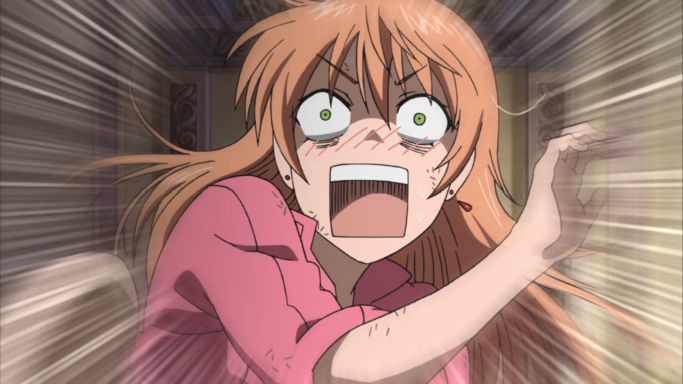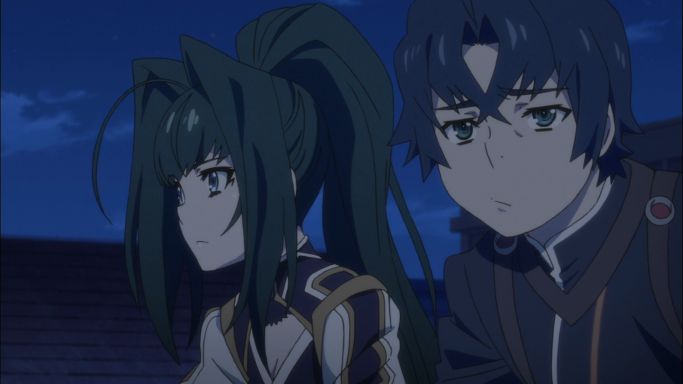Captain Earth – Blasting Off Into a Highly Forgettable Future
Captain Earth is an anime I almost overlooked this spring. The title is tragically generic. Fortunately for me, Joseph insisted Captain Earth was something I needed to watch immediately. Not later, but immediately. I followed his excellent advice and came away from the first episode impressed. Notably, the show reminded me of a straight-faced version of Star Driver. That coincidence was no accident. The animation production is handled by BONES, but the series is directed by Takuya Igarashi and the script is composed by Yoji Enokido. Both Igarashi and Enokido had the same production roles for Star Driver, and that series is considered a spiritual predecessor. Sadly, Captain Earth wears out much of its intriguing welcome halfway through the series. The plot isn’t nearly as interesting as its spiritual predecessor’s and falls into a disappointing routine. I like Captain Earth, I really do. I just find it hard to give it a glowing recommendation because of the numerous flaws.
Daichi Manatsu is a normal 17-year-old teenager with a life that is starting to go adrift. His grades are falling and school no longer holds any meaning for him. He’s often haunted by the memories of his astronaut father who died while on a mission when he was six. One day Daichi sees a strange circular rainbow over the sky of Tanegashima on TV and knows he has to go to the island. During the journey he reminisces about the time he spent as a child with a young boy named Teppei. The boy had the ability to create circular rainbows. He also remembers a longhaired girl named Hana. Once at the island he ventures to the place he met Teppei and Hana. Along the way he’s guided by the sound of a flute to a mute girl who shows him a frightening vision. He sees a giant hostile mech headed to Earth. Daichi immediately realizes if the mech makes it to the surface people might die. He desperately asks the girl how he’s supposed to stop the machine and a gun suddenly forms in his hand.

The teenager is then instantly transported to the island’s space center where a scientist sees the gun and asks Daichi if he’s a captain. The teen replies his father was a captain and the scientist allows him into cockpit of a mech. The machine is launched into space, to the surprise of the rest the space center crew. Once in space it combines into a gigantic robot and takes on the enemy mech, a called Kiltgang. Daichi narrowly wins the fight and temporarily repels the enemy. Back on Earth he learns name of the space center is Globe, and they are dedicated to protecting Earth from the Kiltgangs. Daichi is reunited with Teppei and Hana. Additionally, a brilliant hacker named Akari joins Globe. The four teens form the Midsummer Knights within Globe, and are responsible for directly battling the Kiltgangs.
The resistance against the Kiltgangs isn’t so simple. There are several factions on Earth with their own ideas on how to deal with the alien threat. The small group of aliens who pilot the Kiltgangs are known as Planetary Gears, and they want to devour the life force of every human on Earth. The Macbeth organization wants save humanity by storing the best and brightest in cold sleep in a space station. They are also secretly using the Kiltgang threat to destroy and remake humanity in their own image. To complicate things further, the Kiltgangs have already infiltrated Macbeth and walk the Earth disguised as human avatars. Their presence is unknown to Macbeth and the Planetary Gears freely use the corporation’s resources to further their own goals. Both groups are actively working to bring down Globe and the Midsummer Knights.

Captain Earth is rife with many of the same flaws found in Star Driver. Namely, a lot of unusual terms are causally thrown around in the series. They are important to the plot, but the audience is left to figure out their meaning via inference. The significance of some terms became clear, while other terms are a complete mystery. After 25 episodes I’m still not exactly sure what a Neotany is, or an ectoplasm mode. I’ve largely figured out Livlaster is a sentient being that takes the form of an energy gun, and libido refers to “life force” instead of sexual drive. Even the parts of the terminology the audience can vaguely understand don’t help much. I know a neotany is a human capable of firing the Livlaster, but that doesn’t make the terms any easier to figure out. I really have an issue with Enokido introducing peculiar types of words without taking a moment to explain them. The practice doesn’t add a sense of mystique to the story– it comes off as lazy writing. Thankfully, the confusing terminology can be mostly ignored with the knowledge that Daichi is somehow special.
The unexplained storyline points are another sore spot with me. I lost count of how many times an important event was mentioned and never expounded upon. When did humanity discover the threat of the kiltgangs? How exactly did the Planetary Gears gain human avatar bodies? Why do the Livlasters want to help humanity? Why are only certain humans like Daichi, Teppei and Hana capable of using a Livlasters? Why can’t all humans use them? Or can they? Numerous questions like these persist throughout Captain Earth. Again, the blame is with Enokido and his script. Like the terminology, these questions can be ignored without severely damaging the show’s plot. Even so, it would have been nice if answers could have been worked into the series. Given how much the story could have been a real mess, I’m grateful the show has a gratifying ending.

Captain Earth does have a few bright spots. The plot is coherent even if it has confusing terminology and unexplained events working against it. The lack of cheap plot twists is also refreshing. Major turning points are smartly foreshadowed and unfold in a satisfying manner. The Shakespeare references provided some insight into certain characters. It was no surprise when a self-aware mainframe computer named Puck turned out to be one hell of a clever trickster.
The main characters and their growth were also a treat to watch. It was great to see Daichi, Teppei, Akari, and Hana form the Midsummer Knights and learn to trust one another. The real appeal of Captain Earth is how the kids dealt with all the challenges thrown at them, whether it was life or death struggles or even romantic love. As they won each hard-fought battle the group grew closer together and discovered their own reasons for fighting. It was also nice to see how the Midsummer Knights’ actions had a subtle effect on the immortal Planetary Gears, and how they began to view humans as more than simple prey.

All of the Planetary Gears are given back story as human avatars and are easy to sympathize with. In fact, I found them to be more interesting than the Midsummer Knights. Unfortunately, the majority of the alien group is relegated to “enemy of the week” status after being introduced. Furthermore, they are barely given any screen time after their debut episodes. I would have liked to have known more about them and their immortal lives as spacefaring Kiltgangs.
The strongest aspect of Captain Earth is easily the animation. The colors are bright and vivid. Everything is drawn in great detail and the action scenes always flow fluidly. The characters rarely go off-model and the series is free from annoying drops in quality. Unlike a lot of other series featuring giant robots, the mechs here are hand drawn. (To be fair, there’s nothing wrong with CGI if it’s done well.) That said, the 2D animation of the various mechs never clash or stand out from the rest of Captain Earth. If I had any qualms, it would be with the heavy reuse of animation for the mech combining scenes. Sure, the animation is gorgeous but seeing the same exact scenes (with a background occasionally swapped out), for nearly a dozen episodes is tiring. I had the same exact issue in Star Driver whenever Taburn was summoned into battle. My minor qualms aside, Captain Earth is nothing less than a visual treat. No anime fan should expect any less from a BONES production.

Captain Earth is a solid series that plays it too safe. It lacks the mix of violence and zaniness present in Valvrave the Liberator, the flamboyant flare of Star Driver and the epic thrill of Gurren Lagann. In short, Captain Earth is an anime that will quickly fade from the memory of everyone, save for the most dedicated fans. This series is nothing special and lacks a “wow” factor beyond its gorgeous animation. Yet, I am still fond of Captain Earth. I enjoyed a tale that was largely free of shocking twists, huge plot holes and other frustrating problems found in many newer mech shows. Sometimes the power of friendship, determination, a little romance and a great animation budget can help an otherwise lackluster show. Captain Earth is forgettable, but the experience is pleasant and you could do a lot worse with your viewing time.







I didn’t care for Star Driver. It felt like it was trying to hide its own mediocrity by making itself seem more impressive. “I need to save everyone by spending three minutes summoning of a mechanized fop each week!” Then, I saw Captain Earth, realized it was a second-rate Eureka Seven that was trying to be the next Star Driver (why would anyone want to?), and watched Eureka Seven again, instead.
If somebody wants to give BONES work (because they deserve it), then have them take over World Trigger’s anime. The quality of that show right now is actually worse than One Piece, and it’s only five episodes into the story.
I enjoyed Star Driver a lot. I considered doing a second review in addition to Alex’s, but I’m lazy. I’ll agree the fights are pretty dumb, but I just love how weird the slice-of-life aspects of the show are. The evil after school groups, a galactic pretty boy (complete with a magical girl transformation) and hilarious sexual attention amused me to no end. Then again, I’m easily amused.
Captain Earth did remind me of Eureka Seven, but I haven’t seen enough of that anime to judge it and fully compare it. The majority of it failed to capture my attention when it aired on Adult Swim and I just never got around to giving it a second chance. Ah well. I guess if I enjoyed Captain Earth (though I stand by it being forgettable) I should re-watch Eureka Seven.
It looks like I made the right decision to skip World Trigger this season.